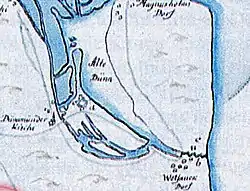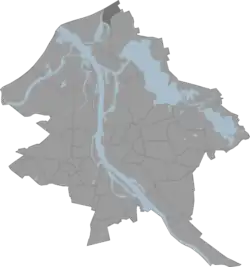Vecāķi
Vecāķi (Latvian pronunciation: [ˈvætsaːci]) is a Northern District neighbourhood in Riga, the capital of Latvia. It is one of Riga's neighborhoods lying on the shores of Gulf of Riga, Baltic Sea. Westward Vecāķi is bordered by Vecdaugava – a partial oxbow lake (a dead-end fork of River Daugava that hasn't been cut off from it completely.) Thus Vecāķi offers both freshwater and brackish water bathing places, with the former having a higher water temperature come summer due to the smaller volume of Vecdaugava.[1]

Vecāķi | |
|---|---|
Neighbourhood of Riga | |
 Location of Vecāķi in Riga | |
| Country | Latvia |
| City | Riga |
| District | Northern District |
| Area | |
| • Total | 2.303 km2 (0.889 sq mi) |
| Population (2017) | |
| • Total | 1,765 |
| • Density | 770/km2 (2,000/sq mi) |
| Website | apkaimes.lv |
German names for the town include Bad Magnushof, Wezaken,[2] and Wetsanck Dorf.
Etymology
The name may be a compound of vecs and āķis pluralized to mean "Old Hook." Vecs being a native Baltic word and āķis ultimately a borrowing from either Middle Low German hake or Middle Dutch haeck.[3]
Dzintra Hirša notes that connecting the name with fishing hooks is a folk etymology and that the name is derived from an alternate sense of āķis from a similar alternative sense of its ultimate source – the Low German hake – "cape; shoal, sandbank."[4]
References
- "Ūdens temperatūra jūrā pie Rīgas +18 grādu, upēs - līdz +24 grādiem" (in Latvian). 22 June 2013. Retrieved November 22, 2013.
- Arbusow, Leonid (1914). "Illustrierter Führer durch den rigaschen Strand, Kemmern, Tuckum, Bad Magnushof (Wezaken), Neubad, Pabbasch, Peterskapelle, sowie deren Umgebung: Mit einer historischen Einleitung".
- Karulis, Konstantīns (1992). Latviešu etimoloģijas vārdnīca. Rīga: Avots. ISBN 5401004117.
- Dzintra Hirša, Lībieši un lībiešu izcelsmes vietvārdi Latvijā in Kersti Boiko's Lībieši – rakstu krājums, page 215